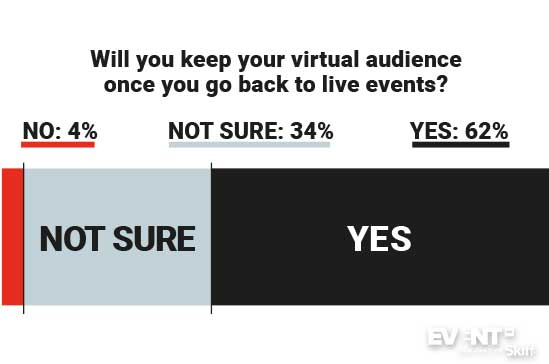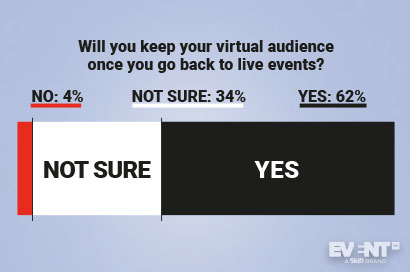62% of event planners say that the future of events is hybrid.
When we asked the direct question in our latest report, The Virtual Event Tech Guide, the majority of our sample seemed to agree.

What we don’t know are the characteristics of these hybrid events.
Every country is dealing with reopenings in their own way. Such fragmentation combined with very high numbers of contagion in North America is adding up to a very volatile environment.
Yet some events are going ahead in a much smaller version in countries where the risk is comparably low. The industry is trying to go back to live, yet there is no real plan to integrate virtual and live interaction, which we refer to as hybrid events.
Why Hybrid Events Are Here to Stay
Event planners seem to agree that most events going forward will have a component of a virtual audience. Quite rightly so.
Here are some reasons why hybrid events will become the norm:
We are changed forever. It’s unrealistic to think that the incredibly absurd collective experience of the past five months won’t change the way we consume events going forward. We had to become fluent in virtual event technology. We now know the benefits of attending online events, as much as we are very clear about the limitations. To think that virtual attendance won’t continue after the crisis ends is naive at best.
We won’t attend at all costs. We all realized that some meetings in person are completely unnecessary. Traveling for thousands of miles polluting the environment for a two-hour meeting is a waste of resources and money few will be able to afford. Once the widespread economic support of the governments most impacted will fade away, many companies will need to cut luxuries such as corporate travel to attend an event. Virtual will always be preferred.
Corporate travel is far from resuming. Music festivals and weddings will go back to live sooner than any business meeting. Business meetings mostly make the ‘event industry’ as we know it. One of the pillars of the event industry is corporate travel, this is why DMOs spend big budgets to win trade shows and incentives: Corporate travel brings money in and local economies thrive. The last piece of information we have from companies such as Facebook and Microsoft is that corporate travel to events with more than 50 people won’t resume before Q3 2021, and looking at the current situation in North America, it won’t be crazy to assume that the date will be pushed even further. Virtual will remain the only way to connect with some audiences.
A part of our audience won’t be able to attend for a while. The reopenings of local economies are re-introducing younger people first, keeping the elderly and those with high risk associated with Covid-19 safe from the virus. The fact is that the percentage of those at high risk and those above 65 years old in the industry is quite substantial. Diseases such as diabetes and cardiovascular problems are very common. Therefore, we may expect this substantial part of our attendees to prefer virtual over live in order to minimize the risk of contracting Covid-19.
These are just some of the reasons why the next year is surely going to have a prevalent online component. Let us reiterate — prevalent — because as much as people can decide to expose themselves to higher risk at pool parties and birthdays, such freedom does not pertain to business environments. We are in for the long run.
So how will things look?
What We Can Expect from Hybrid Events
Hybrid events post or during Covid-19 are very different from what they used to look like until January 2020. Up until then, the online component of an event was an overlooked, annoying and time-consuming task event professionals had to deal with. In those rare instances that they did have an online component, that is.
Things are quite different now and online will be the most prominent part for at least the next six months, with live being the option for the adventurous ones.
There are still a lot of question marks when it comes to how hybrid will function. Yet it is time to start having that conversation, whether we like it or not.
More TV show, less conference. Forget about the live attendance you had before the crisis. The requirements of running safe events as outlined by the WHO and CDC are so many that full capacity will simply be unattainable in most cases. What we can expect is for events to morph into the TV show format: live speakers or performers, a limited live audience, and a strong tech infrastructure.
New high tech ‘venues’. As a result, venue capacity will not be the key requirement for planners. Yes, large rooms will be in demand to keep distancing, but technology will be key and features such as incredibly fast internet speed will be more important than ever.
Bigger budgets for AV than F&B. Hybrid events will require a new set of partners. From this perspective, nimble AV teams able to deliver both live and online events will re-shape the current AV market. Where in fact serving food at live events may be skipped altogether to avoid the incredibly limited options available, technology will receive an incredible budget boost.
Live event tech will win. 100% virtual event platforms are now growing exponentially, but hybrid events will require online audiences to interact with live audiences. The experience will need to be co-created in a two-dimensional environment. As a result, those companies that come from live events will have an inevitable competitive advantage when it comes to better understanding how the interaction between online and offline will work.
At least on paper. Things, in fact, could be very different from what they used to be, and a new set of live event requirements could make previous experience irrelevant. From this perspective, those flexible companies able to interpret what the market wants will win the game.
Event content reset. We cannot think to plan hybrid events with an agenda made for live only. Short attention spans online will need to be taken into consideration. One hour sessions could simply disappear from agendas. This poses a challenge for creating event programs that is both frightening and stimulating. If, in fact, we all loathed the ‘keynote, breakout and repeat’ format of most events, we know for a fact these will need to go. Shorter sessions will prevail.
Engagement tools reset. The tools used to stimulate engagement online will need to be adopted and rolled out to live audiences. Mobile apps will live a second life as they will be the connector between live and virtual audiences to engage with content and to network without barriers.
Speaking will be mostly live. While hybrid events could preserve a component of virtual speaking if the industry is gravitating towards the TV show model, speakers will preferably present in person. That obviously poses questions for those speakers who cannot travel, but we tune into a live TV show to see the interaction between hosts and guests.
Moderators will be key. Giving voice to the online audience has been traditionally one of the limitations of live events. Moderators capable of involving the live and online audience will be instrumental to guarantee there is no bias towards the live audience. In fact the online portion will in most cases be the most substantial bulk of the attendance, and will therefore need to be correctly represented. In the same fashion, having someone dedicated to giving voice to social media comments or questions from the audience will also be helpful to involve online attendees.
IN CONCLUSION
Event professionals say that the future of events is hybrid. Yet there is still a level of uncertainty when it comes to how hybrid events will look.
Technology will be key to delivering online and offline experiences that talk to each other without live attendee bias. Planners are being asked to learn their job all over again.
Getting experience in the short term on how virtual events work remains the most solid strategy to gain a competitive advantage when hybrid events kick-off. In a climate of uncertainty, we need to focus on what we can control. We can control our knowledge of virtual platforms, and we can start guessing how we might use them once live is back in action.
Interesting times ahead.





